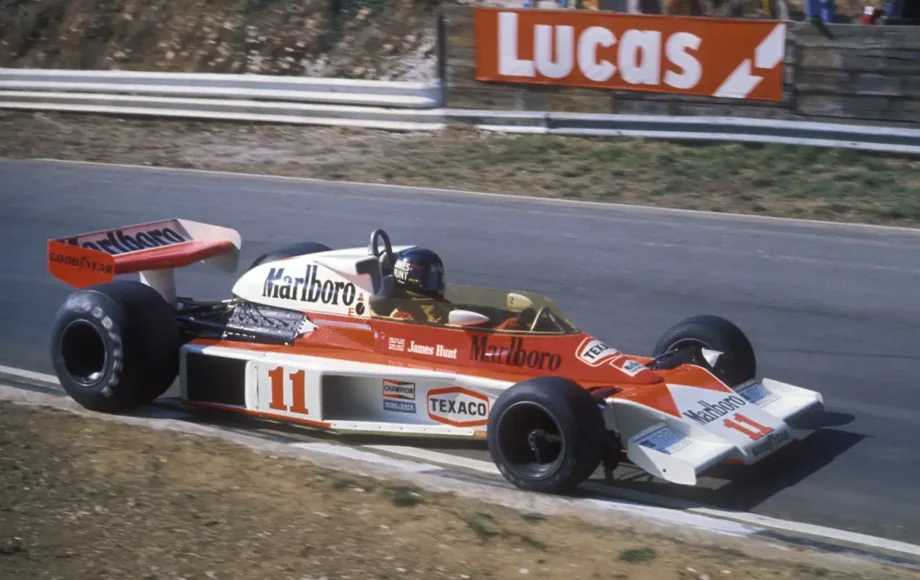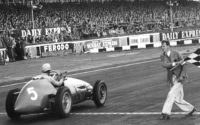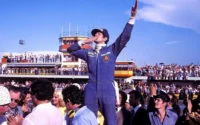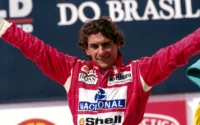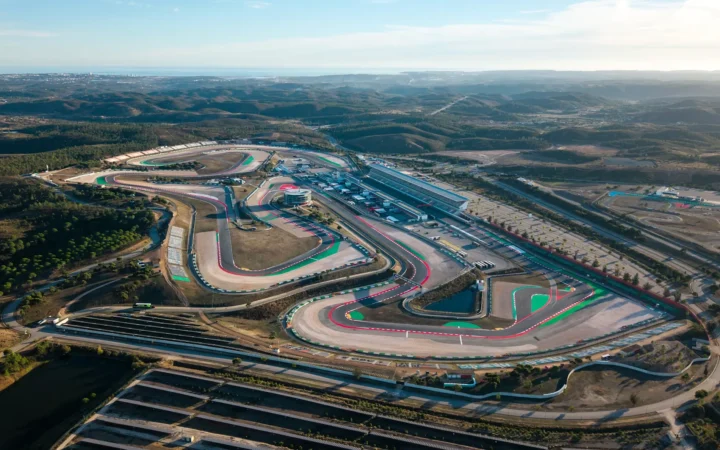What happened on this day, July 18 in Formula 1 history? Find out interesting facts and stories about Formula 1 on this day.
1953
Italian dominance, courtesy of Ferrari and Maserati, was anticipated at Silverstone for the 1953 British Grand Prix, and the race unfolded as expected. Alberto Ascari seized the lead from the start and maintained his position throughout, never once being challenged. He would go on to win the drivers’ title that year. Juan Manuel Fangio finished second for the Maserati team and Ascari’s teammate Nino Farina came in third.
Full Race Report
1953 British Grand Prix Race Results
| Pos | No | Driver | Car | Laps | Time/retired | Pts |
|---|---|---|---|---|---|---|
| 1 | 5 | Alberto Ascari | Ferrari | 90 | 2:50:00.000 | 8.5 |
| 2 | 23 | Juan Manuel Fangio | Maserati | 90 | +60.000s | 6 |
| 3 | 6 | Nino Farina | Ferrari | 88 | +2 laps | 4 |
| 4 | 24 | Jose Froilan Gonzalez | Maserati | 88 | +2 laps | 3.5 |
| 5 | 8 | Mike Hawthorn | Ferrari | 87 | +3 laps | 2 |
| 6 | 25 | Felice Bonetto | Maserati | 82 | +8 laps | 0 |
| 7 | 10 | Prince Bira | Connaught Lea Francis | 82 | +8 laps | 0 |
| 8 | 16 | Ken Wharton | Cooper Bristol | 80 | +10 laps | 0 |
| NC | 18 | Jimmy Stewart | Cooper Bristol | 79 | DNF | 0 |
| 9 | 20 | Peter Whitehead | Cooper Alta | 79 | +11 laps | 0 |
| 10 | 9 | Louis Rosier | Ferrari | 78 | +12 laps | 0 |
| NC | 14 | Tony Rolt | Connaught Lea Francis | 71 | DNF | 0 |
| NC | 7 | Luigi Villoresi | Ferrari | 67 | DNF | 0 |
| NC | 26 | Onofre Marimon | Maserati | 67 | DNF | 0 |
| NC | 2 | Peter Collins | HWM Alta | 56 | DNF | 0 |
| NC | 19 | Alan Brown | Cooper Bristol | 56 | DNF | 0 |
| NC | 4 | Jack Fairman | HWM Alta | 54 | DNF | 0 |
| NC | 12 | Roy Salvadori | Connaught Lea Francis | 50 | DNF | 0 |
| NC | 31 | Toulo de Graffenried | Maserati | 34 | DNF | 0 |
| NC | 1 | Lance Macklin | HWM Alta | 31 | DNF | 0 |
| NC | 30 | Jean Behra | Gordini | 30 | DNF | 0 |
| NC | 15 | Ian Stewart | Connaught Lea Francis | 26 | DNF | 0 |
| NC | 29 | Maurice Trintignant | Gordini | 15 | DNF | 0 |
| NC | 3 | Duncan Hamilton | HWM Alta | 14 | DNF | 0 |
| NC | 17 | Bob Gerard | Cooper Bristol | 8 | DNF | 0 |
| NC | 28 | Harry Schell | Gordini | 5 | DNF | 0 |
| NC | 22 | Tony Crook | Cooper Bristol | 0 | DNF | 0 |
| NC | 11 | Kenneth McAlpine | Connaught Lea Francis | 0 | DNF | 0 |
1959
Due to strikes in Italy, Ferrari missed the 1959 British Grand Prix. However, Tony Brooks, fresh off his victory in France, was released by the team and secured a drive with Vanwall. Driving a Cooper, Jack Brabham took an early lead and remained unchallenged throughout the race to win. The second-place battle was intense, with Stirling Moss in the BRM narrowly edging out Bruce McLaren by just 0.2 seconds.
1959 British Grand Prix Race Results
| Pos | No | Driver | Car | Laps | Time/retired | Pts |
|---|---|---|---|---|---|---|
| 1 | 12 | Jack Brabham | Cooper Climax | 75 | 2:30:11.600 | 8 |
| 2 | 6 | Stirling Moss | BRM | 75 | +22.200s | 6.5 |
| 3 | 16 | Bruce McLaren | Cooper Climax | 75 | +22.400s | 4.5 |
| 4 | 8 | Harry Schell | BRM | 74 | +1 lap | 3 |
| 5 | 18 | Maurice Trintignant | Cooper Climax | 74 | +1 lap | 2 |
| 6 | 2 | Roy Salvadori | Aston Martin | 74 | +1 lap | 0 |
| 7 | 14 | Masten Gregory | Cooper Climax | 73 | +2 laps | 0 |
| 8 | 30 | Alan Stacey | Lotus Climax | 71 | +4 laps | 0 |
| 9 | 28 | Graham Hill | Lotus Climax | 70 | +5 laps | 0 |
| 10 | 48 | Chris Bristow | Cooper Borgward | 70 | +5 laps | 0 |
| NC | 4 | Carroll Shelby | Aston Martin | 69 | DNF | 0 |
| 11 | 58 | Henry Taylor | Cooper Climax | 69 | +6 laps | 0 |
| 12 | 52 | Peter Ashdown | Cooper Climax | 69 | +6 laps | 0 |
| 13 | 46 | Ivor Bueb | Cooper Borgward | 69 | +6 laps | 0 |
| NC | 40 | Fritz d’Orey | Maserati | 57 | DNF | 0 |
| NC | 42 | Ron Flockhart | BRM | 53 | DNF | 0 |
| NC | 38 | Jack Fairman | Cooper Climax | 39 | DNF | 0 |
| NC | 10 | Jo Bonnier | BRM | 37 | DNF | 0 |
| NC | 22 | Ian Burgess | Cooper Maserati | 31 | DNF | 0 |
| NC | 24 | Hans Herrmann | Cooper Maserati | 21 | DNF | 0 |
| NC | 64 | David Piper | Lotus Climax | 19 | DNF | 0 |
| NC | 36 | Brian Naylor | JBW Maserati | 18 | DNF | 0 |
| NC | 50 | Mike Taylor | Cooper Climax | 17 | DNF | 0 |
| NC | 20 | Tony Brooks | Vanwall | 13 | DNF | 0 |
1965
Jim Clark showcased his dominance at the 1965 Dutch Grand Prix, quickly overtaking Richie Ginther and Graham Hill within the first five laps and cruising to victory for Lotus. This win marked his fifth in six races that season, virtually securing the championship title for Clark. For Hill to have any chance of overtaking him, he would have needed to win all four remaining races.
1965 Dutch Grand Prix Race Results
| Pos | No | Driver | Car | Laps | Time/retired | Pts |
|---|---|---|---|---|---|---|
| 1 | 6 | Jim Clark | Lotus Climax | 80 | 2:03:59.100 | 9 |
| 2 | 12 | Jackie Stewart | BRM | 80 | +8.000s | 6 |
| 3 | 16 | Dan Gurney | Brabham Climax | 80 | +13.000s | 4 |
| 4 | 10 | Graham Hill | BRM | 80 | +45.100s | 3 |
| 5 | 14 | Denny Hulme | Brabham Climax | 79 | +1 lap | 2 |
| 6 | 22 | Richie Ginther | Honda | 79 | +1 lap | 1 |
| 7 | 2 | John Surtees | Ferrari | 79 | +1 lap | 0 |
| 8 | 8 | Mike Spence | Lotus Climax | 79 | +1 lap | 0 |
| 9 | 4 | Lorenzo Bandini | Ferrari | 79 | +1 lap | 0 |
| 10 | 38 | Innes Ireland | Lotus BRM | 78 | +2 laps | 0 |
| 11 | 30 | Frank Gardner | Brabham BRM | 77 | +3 laps | 0 |
| 12 | 34 | Richard Attwood | Lotus BRM | 77 | +3 laps | 0 |
| 13 | 28 | Jo Siffert | Brabham BRM | 55 | +25 laps | 0 |
| NC | 20 | Jochen Rindt | Cooper Climax | 48 | DNF | 0 |
| NC | 18 | Bruce McLaren | Cooper Climax | 36 | DNF | 0 |
| NC | 26 | Jo Bonnier | Brabham Climax | 16 | DNF | 0 |
| NC | 36 | Bob Anderson | Brabham Climax | 11 | DNF | 0 |
1970
Jack Brabham came heartbreakingly close to victory in the 1970 British Grand Prix, only to run out of fuel on the final lap. As he coasted towards the chequered flag, Jochen Rindt overtook him for the win. Brabham had just enough momentum to cross the finish line ahead of Denny Hulme in the McLaren, securing second place and Hulme third.
This was the first F1 race for Brazilian future World Champion Emerson Fittipaldi, who qualified 21st and finished eighth in an older Lotus 49. It was also the final F1 race for American Dan Gurney.
1970 British Grand Prix Race Results
| Pos | No | Driver | Car | Laps | Time/retired | Pts |
|---|---|---|---|---|---|---|
| 1 | 5 | Jochen Rindt | Lotus Ford | 80 | 1:57:02.000 | 9 |
| 2 | 17 | Jack Brabham | Brabham Ford | 80 | +32.900s | 6 |
| 3 | 9 | Denny Hulme | McLaren Ford | 80 | +54.400s | 4 |
| 4 | 4 | Clay Regazzoni | Ferrari | 80 | +54.800s | 3 |
| 5 | 16 | Chris Amon | March Ford | 79 | +1 lap | 2 |
| 6 | 14 | Graham Hill | Lotus Ford | 79 | +1 lap | 1 |
| 7 | 2 | Francois Cevert | March Ford | 79 | +1 lap | 0 |
| 8 | 28 | Emerson Fittipaldi | Lotus Ford | 78 | +2 laps | 0 |
| 9 | 27 | Ronnie Peterson | March Ford | 72 | +8 laps | 0 |
| NC | 29 | Pete Lovely | Lotus Ford | 69 | +11 laps | 0 |
| NC | 10 | Dan Gurney | McLaren Ford | 60 | DNF | 0 |
| NC | 22 | Pedro Rodriguez | BRM | 58 | DNF | 0 |
| NC | 23 | Jackie Oliver | BRM | 54 | DNF | 0 |
| NC | 1 | Jackie Stewart | March Ford | 52 | DNF | 0 |
| NC | 20 | John Surtees | Surtees Ford | 51 | DNF | 0 |
| NC | 8 | Henri Pescarolo | Matra | 41 | DNF | 0 |
| NC | 7 | Jean-Pierre Beltoise | Matra | 24 | DNF | 0 |
| NC | 26 | Mario Andretti | March Ford | 21 | DNF | 0 |
| NC | 15 | Jo Siffert | March Ford | 19 | DNF | 0 |
| NC | 6 | John Miles | Lotus Ford | 15 | DNF | 0 |
| NC | 24 | George Eaton | BRM | 10 | DNF | 0 |
| NC | 3 | Jacky Ickx | Ferrari | 6 | DNF | 0 |
1976
The 1976 British Grand Prix was one of the most controversial in history, with the final outcome not determined until 24 September, over two months after the chequered flag. Initially, James Hunt, driving for McLaren, was declared the winner, but his victory was later overturned following an appeal by Ferrari.
The controversy began when the race was red-flagged after a pile-up at the first corner, leading to a restart. James Hunt, whose car was damaged in the crash, faced disqualification from the restart; the race stewards announced that no driver would be allowed to take part in the restarted race unless they were in their original car and that they had finished the first lap of the original race. However, due to the stewards’ fear of the large, angry crowd throwing beer cans onto the track and chanting, “We want Hunt!” they caved and allowed Hunt to use his repaired car and rejoin the grid.
During the race, Niki Lauda took the lead until lap 45, when gearbox problems forced him to slow down, allowing Hunt to pass and eventually win the race. Ferrari immediately protested, claiming Hunt had already been eliminated when the red flag was shown. Hunt argued that his car was still moving despite a severely damaged chassis and pointed out that Ferrari driver Niki Lauda caused the crash.
Although the stewards initially rejected Ferrari’s protest, the case was referred to the FIA, which ultimately ruled in Ferrari’s favour. This decision had the potential to be decisive in the 1976 drivers’ championship. However, heavy rain in Japan later in the season led to Lauda’s retirement from that race, ensuring that the lost points from the British Grand Prix did not cost Hunt the championship title. In the end, Lauda won the race, from Jody Scheckter in second for Tyrrell and John Watson in third for Penske.
1976 British Grand Prix Race Results
| Pos | No | Driver | Car | Laps | Time/retired | Pts |
|---|---|---|---|---|---|---|
| DQ | 11 | James Hunt | McLaren Ford | 76 | 0 | |
| 1 | 1 | Niki Lauda | Ferrari | 76 | 1:44:19.660 | 9 |
| 2 | 3 | Jody Scheckter | Tyrrell Ford | 76 | +16.180s | 6 |
| 3 | 28 | John Watson | Penske Ford | 75 | +1 lap | 4 |
| 4 | 16 | Tom Pryce | Shadow Ford | 75 | +1 lap | 3 |
| 5 | 19 | Alan Jones | Surtees Ford | 75 | +1 lap | 2 |
| 6 | 30 | Emerson Fittipaldi | Fittipaldi Ford | 74 | +2 laps | 1 |
| 7 | 24 | Harald Ertl | Hesketh Ford | 73 | +3 laps | 0 |
| 8 | 8 | Carlos Pace | Brabham Alfa Romeo | 73 | +3 laps | 0 |
| 9 | 17 | Jean-Pierre Jarier | Shadow Ford | 70 | +6 laps | 0 |
| NC | 6 | Gunnar Nilsson | Lotus Ford | 67 | DNF | 0 |
| NC | 10 | Ronnie Peterson | March Ford | 60 | DNF | 0 |
| NC | 18 | Brett Lunger | Surtees Ford | 55 | DNF | 0 |
| NC | 4 | Patrick Depailler | Tyrrell Ford | 47 | DNF | 0 |
| NC | 7 | Carlos Reutemann | Brabham Alfa Romeo | 46 | DNF | 0 |
| NC | 35 | Arturo Merzario | March Ford | 39 | DNF | 0 |
| NC | 2 | Clay Regazzoni | Ferrari | 36 | DNF | 0 |
| NC | 26 | Jacques Laffite | Ligier Matra | 31 | DNF | 0 |
| NC | 32 | Bob Evans | Brabham Alfa Romeo | 31 | DNF | 0 |
| NC | 9 | Vittorio Brambilla | March Ford | 22 | DNF | 0 |
| NC | 38 | Henri Pescarolo | Surtees Ford | 16 | DNF | 0 |
| NC | 22 | Chris Amon | Ensign Ford | 8 | DNF | 0 |
| NC | 5 | Mario Andretti | Lotus Ford | 4 | DNF | 0 |
| NC | 12 | Jochen Mass | McLaren Ford | 1 | DNF | 0 |
| NC | 34 | Hans-Joachim Stuck | March Ford | 0 | DNF | 0 |
| NC | 25 | Guy Edwards | Hesketh Ford | 0 | DNF | 0 |
1981
John Watson emerged as the unexpected but widely celebrated winner of the 1981 British Grand Prix. Driving a McLaren, he managed to catch up to the turbocharged Renaults and capitalise on their mechanical issues. René Arnoux led the race, with his turbo engine expected to outpace Watson’s Cosworth-powered McLaren. However, on lap 50, Arnoux’s Renault began to falter. Watson swiftly took the lead, while Arnoux’s deteriorating engine prevented him from earning even a single championship point.
Carlos Reutemann finished in second place for Williams, and Jacques Laffite finished third place for Ligier. The race also became the first victory for a carbon fibre composite monocoque F1 car, the McLaren MP4/1.
1981 British Grand Prix Race Results
| Pos | No | Driver | Car | Laps | Time/retired | Pts |
|---|---|---|---|---|---|---|
| 1 | 7 | John Watson | McLaren Ford | 68 | 1:26:54.800 | 9 |
| 2 | 2 | Carlos Reutemann | Williams Ford | 68 | +40.650s | 6 |
| 3 | 26 | Jacques Laffite | Ligier Matra | 67 | +1 lap | 4 |
| 4 | 3 | Eddie Cheever | Tyrrell Ford | 67 | +1 lap | 3 |
| 5 | 6 | Hector Rebaque | Brabham Ford | 67 | +1 lap | 2 |
| 6 | 10 | Slim Borgudd | ATS Ford | 67 | +1 lap | 1 |
| 7 | 17 | Derek Daly | March Ford | 66 | +2 laps | 0 |
| 8 | 32 | Jean-Pierre Jarier | Osella Hart | 65 | +3 laps | 0 |
| 9 | 16 | Rene Arnoux | Renault | 64 | DNF | 0 |
| 10 | 29 | Riccardo Patrese | Arrows Ford | 64 | DNF | 0 |
| 11 | 33 | Marc Surer | Theodore Ford | 61 | DNF | 0 |
| NC | 22 | Mario Andretti | Alfa Romeo | 59 | DNF | 0 |
| NC | 20 | Keke Rosberg | Fittipaldi Ford | 56 | DNF | 0 |
| NC | 11 | Elio de Angelis | Lotus Ford | 25 | DNF | 0 |
| NC | 15 | Alain Prost | Renault | 17 | DNF | 0 |
| NC | 25 | Patrick Tambay | Ligier Matra | 15 | DNF | 0 |
| NC | 28 | Didier Pironi | Ferrari | 13 | DNF | 0 |
| NC | 5 | Nelson Piquet | Brabham Ford | 11 | DNF | 0 |
| NC | 23 | Bruno Giacomelli | Alfa Romeo | 5 | DNF | 0 |
| NC | 27 | Gilles Villeneuve | Ferrari | 4 | DNF | 0 |
| NC | 1 | Alan Jones | Williams Ford | 3 | DNF | 0 |
| NC | 8 | Andrea de Cesaris | McLaren Ford | 3 | DNF | 0 |
| NC | 4 | Michele Alboreto | Tyrrell Ford | 0 | DNF | 0 |
| NC | 30 | Siegfried Stohr | Arrows Ford | 0 | DNF | 0 |
1982
Niki Lauda redeemed his poor track record at Brands Hatch by winning the 1982 British Grand Prix after a chaotic start. Pole-sitter Keke Rosberg in the Williams failed to start during the warm-up lap due to fuel vaporisation caused by the hot weather. A watering can of cold water eventually solved the problem, but by then, the rest of the pack had already set off, forcing Rosberg to start from the back. At the race’s start, Riccardo Patrese stalled his Brabham and was subsequently hit by René Arnoux’s Renault.
Didier Pironi finished second in a Ferrari, while teammate Patrick Tambay taking his first F1 podium finish by coming third.
1982 British Grand Prix Race Results
| Pos | No | Driver | Car | Laps | Time/retired | Pts |
|---|---|---|---|---|---|---|
| 1 | 8 | Niki Lauda | McLaren Ford | 76 | 1:35:33.812 | 9 |
| 2 | 28 | Didier Pironi | Ferrari | 76 | +25.730s | 6 |
| 3 | 27 | Patrick Tambay | Ferrari | 76 | +38.440s | 4 |
| 4 | 11 | Elio de Angelis | Lotus Ford | 76 | +41.240s | 3 |
| 5 | 5 | Derek Daly | Williams Ford | 76 | +41.430s | 2 |
| 6 | 15 | Alain Prost | Renault | 76 | +41.640s | 1 |
| 7 | 23 | Bruno Giacomelli | Alfa Romeo | 75 | +1 lap | 0 |
| 8 | 4 | Brian Henton | Tyrrell Ford | 75 | +1 lap | 0 |
| 9 | 30 | Mauro Baldi | Arrows Ford | 74 | +2 laps | 0 |
| 10 | 17 | Jochen Mass | March Ford | 73 | +3 laps | 0 |
| NC | 22 | Andrea de Cesaris | Alfa Romeo | 66 | DNF | 0 |
| NC | 25 | Eddie Cheever | Ligier Matra | 60 | DNF | 0 |
| NC | 29 | Marc Surer | Arrows Ford | 59 | DNF | 0 |
| NC | 6 | Keke Rosberg | Williams Ford | 50 | DNF | 0 |
| NC | 3 | Michele Alboreto | Tyrrell Ford | 44 | DNC | 0 |
| NC | 26 | Jacques Laffite | Ligier Matra | 41 | DNF | 0 |
| NC | 35 | Derek Warwick | Toleman Hart | 40 | DNF | 0 |
| NC | 12 | Nigel Mansell | Lotus Ford | 29 | DNF | 0 |
| NC | 1 | Nelson Piquet | Brabham BMW | 9 | DNF | 0 |
| NC | 14 | Roberto Guerrero | Ensign Ford | 3 | DNF | 0 |
| NC | 31 | Jean-Pierre Jarier | Osella Ford | 2 | DNF | 0 |
| NC | 20 | Chico Serra | Fittipaldi Ford | 2 | DNF | 0 |
| NC | 7 | John Watson | McLaren Ford | 2 | DNF | 0 |
| NC | 36 | Teo Fabi | Toleman Hart | 0 | DNF | 0 |
| NC | 16 | Rene Arnoux | Renault | 0 | DNF | 0 |
| NC | 2 | Riccardo Patrese | Brabham BMW | 0 | DNF | 0 |
2021
The 2021 British Grand Prix made F1 history by introducing Formula One’s first-ever “Sprint Qualifying” event—a new format held on Saturday, covering a 100-kilometre (62-mile) distance. Points were awarded to the top three finishers: three points for the winner, two for second place, and one for third. The results of the sprint determined the starting grid for Sunday’s race.
Lewis Hamilton set the fastest time in traditional qualifying, securing pole position for the Sprint. However, it was Max Verstappen who won the Sprint Qualifying, earning pole position for the Grand Prix.
The race was defined by a dramatic first-lap collision between Hamilton and Verstappen at Copse Corner, sending Verstappen into the barriers and forcing him to retire. The crash led to a 10-second time penalty for Hamilton, who was deemed at fault for the incident. Despite the penalty, Hamilton mounted a remarkable comeback, overtaking the Ferrari of Charles Leclerc in the final laps to claim victory, securing his eighth British Grand Prix win. Leclerc finished second, while Valtteri Bottas completed the podium in third.
2021 British Grand Prix Race Results
| Pos | No | Driver | Car | Laps | Time/retired | Pts |
|---|---|---|---|---|---|---|
| 1 | 44 | Lewis Hamilton | Mercedes | 52 | 1:58:23.284 | 25 |
| 2 | 16 | Charles Leclerc | Ferrari | 52 | +3.871s | 18 |
| 3 | 77 | Valtteri Bottas | Mercedes | 52 | +11.125s | 15 |
| 4 | 4 | Lando Norris | McLaren Mercedes | 52 | +28.573s | 12 |
| 5 | 3 | Daniel Ricciardo | McLaren Mercedes | 52 | +42.624s | 10 |
| 6 | 55 | Carlos Sainz | Ferrari | 52 | +43.454s | 8 |
| 7 | 14 | Fernando Alonso | Alpine Renault | 52 | +72.093s | 6 |
| 8 | 18 | Lance Stroll | Aston Martin Mercedes | 52 | +74.289s | 4 |
| 9 | 31 | Esteban Ocon | Alpine Renault | 52 | +76.162s | 2 |
| 10 | 22 | Yuki Tsunoda | AlphaTauri Honda | 52 | +82.065s | 1 |
| 11 | 10 | Pierre Gasly | AlphaTauri Honda | 52 | +85.327s | 0 |
| 12 | 63 | George Russell | Williams Mercedes | 51 | +1 lap | 0 |
| 13 | 99 | Antonio Giovinazzi | Alfa Romeo Racing Ferrari | 51 | +1 lap | 0 |
| 14 | 6 | Nicholas Latifi | Williams Mercedes | 51 | +1 lap | 0 |
| 15 | 7 | Kimi Räikkönen | Alfa Romeo Racing Ferrari | 51 | +1 lap | 0 |
| 16 | 11 | Sergio Perez | Red Bull Racing Honda | 51 | +1 lap | 0 |
| 17 | 9 | Nikita Mazepin | Haas Ferrari | 51 | +1 lap | 0 |
| 18 | 47 | Mick Schumacher | Haas Ferrari | 51 | +1 lap | 0 |
| NC | 5 | Sebastian Vettel | Aston Martin Mercedes | 40 | DNF | 0 |
| NC | 33 | Max Verstappen | Red Bull Racing Honda | 0 | DNF | 0 |
F1 Driver Birthdays 18 July
| Births | F1 Driver |
|---|---|
| 18 July 1911 | Danny Oakes (d. 2007) |
| 18 July 1920 | Eric Brandon (d. 1982) |
| Births | F1 Mentions |
|---|---|
| 18 July 1911 | Richard Branson Virgin Racing (subsequently Marussia Virgin Racing) was a Formula One racing team which was under management of Manor Motorsport, Wirth Research and Richard Branson’s Virgin Group |
| 18 July 2001 | Enzo Fittipaldi Brazilian racing driver. He is the grandson of Emerson Fittipaldi and brother of Pietro Fittipaldi. |
F1 Driver Deaths 18 July
| Deaths | F1 Driver |
|---|---|
| 18 July 2009 | Ricardo Londono (b. 1949) |
Seen in:

